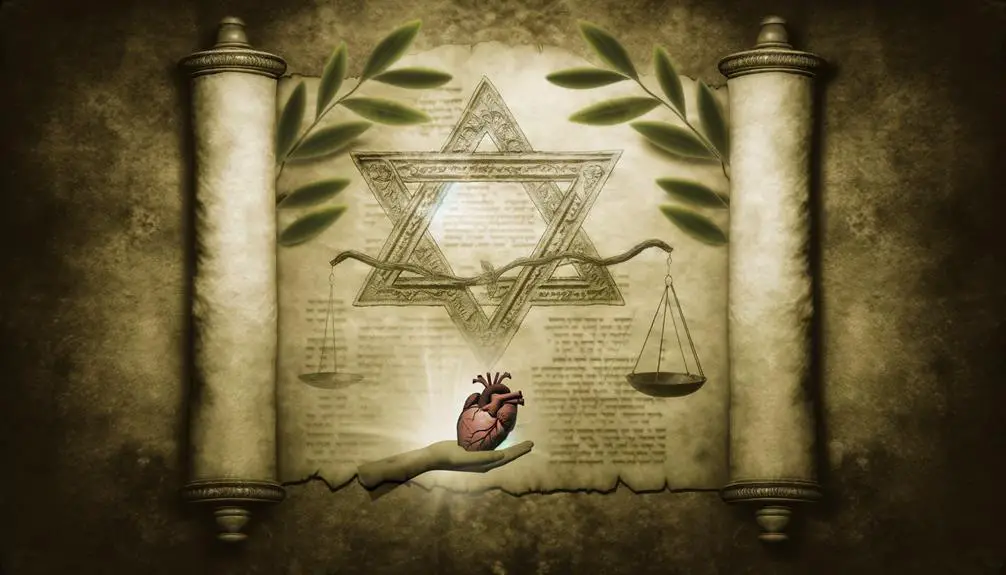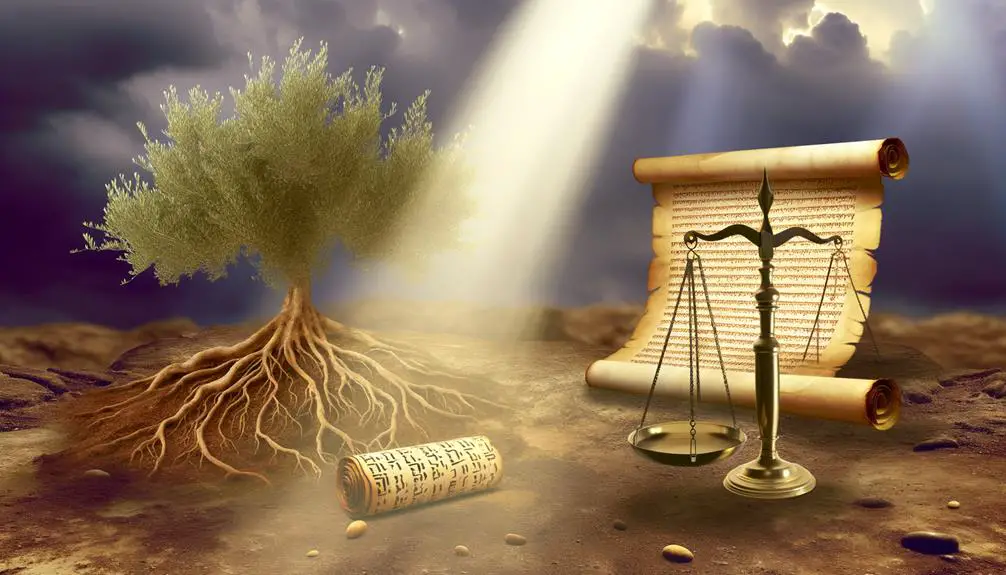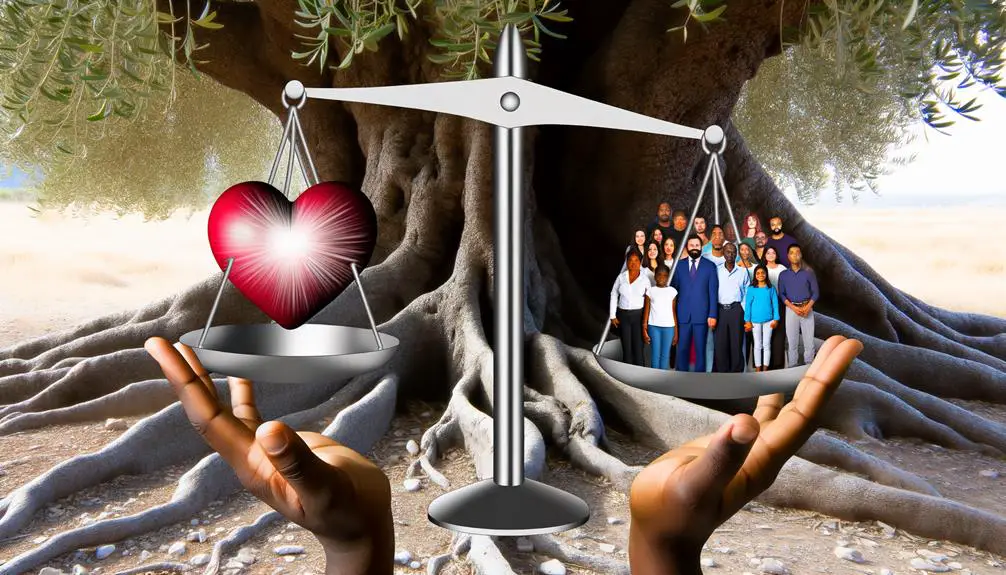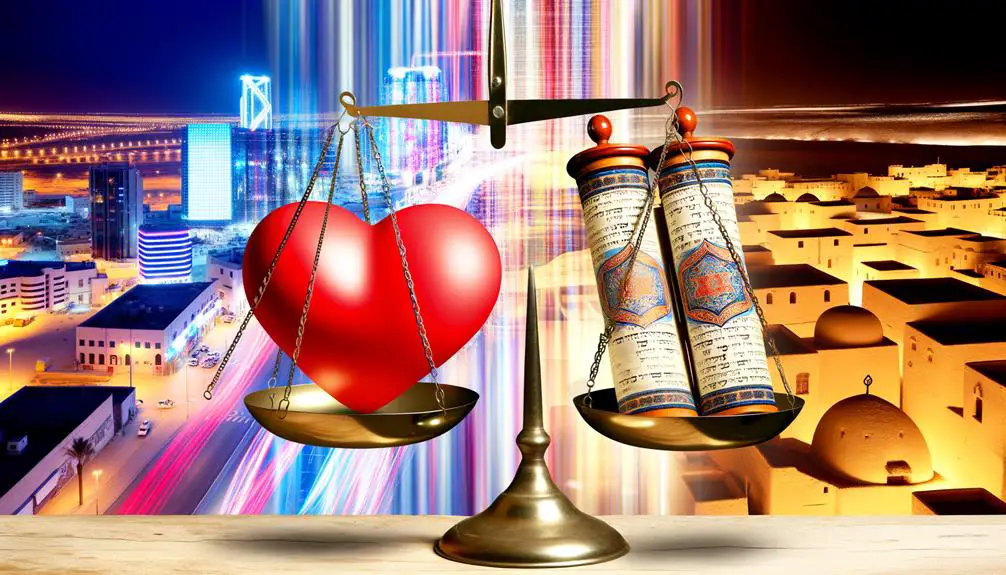Plunge into the depths of 'Tzedek,' the Hebrew word for righteousness in the Bible, and discover how it shapes divine justice and human conduct.

Hebrew Word for Righteousness in the Bible
In the rich tapestry of Biblical language, the concept of 'walking the straight path' often leads you to the Hebrew word 'Tzedek,' which stands for righteousness. This term isn't just a simple adjective; it's a principle that threads through the fabric of Biblical narratives, offering insights into the divine expectation of justice and moral uprightness.
As you explore the origins of Tzedek and its application in both personal and societal contexts, you'll uncover layers of meaning that could transform your understanding of righteousness. The journey through its theological implications and role in prophetic literature is not only enlightening but might also challenge your perspectives on living Tzedek today.
Why does it matter? The answer lies in the balance between personal righteousness and societal duties, a balance that Tzedek intriguingly navigates.
Key Takeaways
- The Hebrew word for righteousness, "Tzedek," emphasizes justice, fairness, and moral integrity.
- Tzedek is deeply rooted in the character of God and foundational to the covenant relationship with humanity.
- Prophetic teachings in the Bible extend Tzedek beyond legal compliance to include societal justice and personal dignity.
- Modern applications of Tzedek call for active engagement in social justice, environmental stewardship, and personal ethical living.
The Origins of Tzedek

How does the term 'Tzedek,' central to Hebrew theology and jurisprudence, trace its origins in ancient texts? You'll find that its roots are deeply embedded within the Hebrew etymology, providing a foundational concept that has been interpreted and reinterpreted through the ages. The word 'Tzedek' itself originates from the Semitic root T-Z-D-K, which conveys notions of justice, righteousness, and fairness. This linguistic foundation underscores the term's intrinsic connection to moral and ethical behavior, a core aspect of communal life and divine expectation in ancient Hebrew society.
Delving deeper, you'll uncover that 'Tzedek' is more than a mere word; it's a principle that shapes the moral fabric of Hebrew culture and law. It signifies a kind of righteousness that isn't confined to personal virtue alone but extends to societal justice and equity. This dual application bridges the individual and the collective, highlighting the term's comprehensive reach in guiding behavior and legal standards.
Modern interpretations of 'Tzedek' have built upon this rich etymological and cultural heritage, expanding its application to contemporary issues of social justice and ethical conduct. Scholars and theologians alike continue to explore its nuances, drawing on ancient texts to inform present-day understandings. This ongoing dialogue between the past and the present ensures that 'Tzedek' remains a vibrant and dynamic concept within Jewish thought, adapting to meet the challenges of each generation while staying true to its ancient roots.
Tzedek in Biblical Narratives

You'll find that tzedek plays a pivotal role across various narratives within the Hebrew Bible, from its foundational presence in the creation story to the emphasis placed upon it by the prophets and its integral role in the Psalms.
This exploration reveals how tzedek isn't merely a concept but acts as a dynamic force for justice and righteousness, shaping the moral and ethical landscape of these ancient texts. Each instance of tzedek in these contexts not only underscores its importance but also offers insight into the evolving understanding of righteousness within biblical theology.
Tzedek in Creation Story
In the context of biblical narratives, the term 'tzedek,' or righteousness, plays a pivotal role in the creation story, illustrating the foundational principles upon which the world was established. This concept of righteousness isn't only about moral or ethical behavior but also encompasses creation ethics and divine balance, integral to the fabric of existence.
- *Tzedek* signifies a world created with inherent order and balance.
- It sets a precedent for human conduct in alignment with divine will.
- The narrative underscores the importance of harmony between all created beings.
- *Tzedek* in creation foreshadows the pursuit of justice in human societies.
- It reflects a divine expectation of maintaining balance within the cosmos.
Analyzing *tzedek* in this light reveals the depth of its significance in the biblical tradition, emphasizing a holistic approach to righteousness that encompasses both ethical behavior and cosmic order.
Prophets Emphasize Tzedek
Throughout the biblical narratives, prophets ardently stress the importance of *tzedek*, positioning it as a cornerstone for societal justice and individual conduct. They articulate a righteousness definition that transcends mere legal compliance, embedding it within the fabric of moral complexity.
This emphasis serves not just as a directive for ethical behavior but as a framework through which the prophets critique their society. They argue that true *tzedek* isn't only about adhering to laws but understanding the deeper moral imperatives that those laws represent. It's a call to recognize the inherent dignity of each individual and to act in ways that affirm and protect that dignity.
Through their teachings, the prophets illuminate the multifaceted nature of righteousness, challenging their audience to pursue a higher standard of justice and moral integrity.
Tzedek's Role in Psalms
Shifting focus to the Psalms, it's evident that *tzedek* assumes a pivotal role, embodying themes of divine justice and personal virtue that echo the prophetic messages. In the realm of Psalms interpretation, understanding *tzedek* enriches our grasp of these ancient songs, revealing layers of musical righteousness that interweave with the fabric of spiritual life.
- *Tzedek* in Psalms underscores the fairness of God's judgments.
- It highlights the moral imperative for individuals to pursue righteousness.
- Psalms frequently associate *tzedek* with salvation and deliverance.
- *Tzedek* serves as a bridge connecting divine action with human ethics.
- The use of *tzedek* in Psalms fosters a deeper appreciation for the theological depth of these musical expressions of faith.
Theological Implications of Righteousness

Examining the concept of righteousness in biblical texts reveals profound theological implications, notably how it shapes the relationship between humans and the divine. You'll find that righteousness isn't merely an ethical standard but is deeply rooted in the very character of God. This understanding invites you to explore the origins of righteousness and its reflection of divine morality.
Righteousness in biblical discourse isn't just about right action but encompasses a state of being that aligns with God's nature. It's about a covenantal relationship where righteousness becomes a bridge between divinity and humanity, reflecting not only moral purity but also justice, mercy, and faithfulness.
Aspect of Righteousness |
Theological Implication |
|---|---|
Divine Origin |
Righteousness originates from God, making it an absolute, unchanging standard. |
Human Participation |
Humans are called to emulate God's righteousness, linking ethical living to divine worship. |
Covenant Relationship |
Righteousness is both a requirement and a gift within the covenant, showcasing God's grace. |
Eschatological Promise |
It points toward a future where God's righteousness will fully manifest, restoring all creation. |
This framework not only elevates the concept of righteousness beyond mere legalism but also integrates it with the larger narrative of redemption and restoration. You are thus invited to view righteousness as an expression of divine morality that calls for human response, bridging the gap between the earthly and the divine. It's a dynamic, living concept that invites continuous exploration and application, deeply enriching your theological understanding and personal faith journey.
Righteousness in Prophetic Literature

You'll find that in prophetic literature, the call to righteousness transcends mere personal morality, intertwining with demands for societal justice. Prophets articulate divine expectations of righteousness that encompass both individual ethics and communal equity.
This shift highlights a multifaceted concept of righteousness, pivotal for understanding the holistic nature of justice in the biblical narrative.
Prophets' Call to Righteousness
Numerous prophets in the Hebrew Bible ardently advocate for righteousness, urging societies to adhere to moral and divine laws. Their messages often delve into ethical dilemmas and underscore the importance of moral accountability. These ancient voices challenge their audiences to reflect on their actions and align them with the divine will.
- Ethical Dilemmas: Prophets frequently presented scenarios that tested the moral fiber of society.
- Moral Accountability: There's a strong emphasis on individual and communal responsibility.
- Divine Laws: Highlighting the importance of following God's commandments.
- Societal Reflection: Encouraging communities to introspect and amend wrongful behaviors.
- Divine Will Alignment: Urging people to align their actions with God's intentions for justice and righteousness.
This scholarly analysis reveals the depth of the prophets' call to righteousness, emphasizing ethical living and divine compliance.
Justice in Prophetic Voices
Building on the prophets' advocacy for moral accountability, their call for justice emerges as a central theme in prophetic literature, emphasizing the need for societal adherence to ethical and divine mandates. This insistence isn't merely historical; it resonates deeply with modern interpretations.
You'll find that contemporary scholars dissect these ancient texts, uncovering layers of meaning relevant to today's ethical dilemmas. They argue that the prophets weren't just foretellers of doom but were primarily social reformers. Their passionate pleas for justice and righteousness were aimed at rectifying societal ills – from corruption to exploitation.
This profound connection between ancient advocacy and present-day challenges highlights the timeless relevance of prophetic voices, urging a reevaluation of our ethical frameworks in light of their enduring wisdom.
Righteousness: Divine Expectations
Exploring righteousness within prophetic literature unveils divine expectations that transcend mere legal adherence, inviting a deeper, more holistic commitment to ethical living. This narrative is rich with insights into God's standards, contrasting sharply with human interpretations of righteousness. The prophets articulate a vision where righteousness isn't just about individual morality but encompasses social justice, care for the marginalized, and integrity in leadership.
To deepen your understanding, consider these aspects:
- The emphasis on justice and mercy
- The critique of ritual without ethical living
- The call for communal responsibility
- The vision for a society grounded in divine righteousness
- The contrast between divine expectations and human practices
This exploration reveals a multifaceted view of righteousness that challenges you to rethink your approach to faith and ethics in light of prophetic wisdom.
Tzedek and Social Justice

Delving into the concept of tzedek reveals its profound connection with social justice, anchoring its roots in the ethical and moral foundations of society. This Hebrew term, often translated as 'righteousness,' encompasses far more than personal morality; it demands an unwavering commitment to societal equity and fairness. Through the lens of tzedek, the Bible's teachings extend beyond individual conduct to address the structural dimensions of justice, challenging followers to confront and rectify economic disparities and injustices that plague communities.
Modern activism, with its focus on addressing systemic inequalities, finds a resonant echo in the biblical call for tzedek. The scriptural imperative to pursue justice isn't a passive recommendation but a directive that compels active engagement with the world's injustices. This engagement is particularly pertinent in the face of economic disparities, where tzedek demands not merely charity, but a restructuring of societal systems to ensure equitable distribution of resources and opportunities.
The biblical concept of tzedek, therefore, serves as a foundational principle for social justice movements, providing a theological basis for the fight against economic inequality. It calls for a reevaluation of societal norms and structures that perpetuate disparity, urging a move towards a more just and equitable society. In this way, tzedek transcends its ancient origins, offering timeless guidance on the pursuit of social justice in the contemporary world. Through its emphasis on justice and equity, tzedek challenges individuals and communities alike to embody its principles, weaving the pursuit of righteousness into the fabric of societal progress.
Personal Righteousness Vs. Societal Duties

The juxtaposition of personal righteousness and societal duties unveils a complex interplay within the biblical framework, prompting an examination of how individuals balance moral integrity with the obligations owed to their communities. You're called to navigate ethical dilemmas, often finding yourself at the crossroads of personal conviction and the needs of the wider society. This tension isn't just theoretical; it's a daily reality that requires keen judgment and self-assessment practices.
Consider the following points that deepen this exploration:
- Ethical dilemmas often arise when personal righteousness seems at odds with societal expectations, forcing you to make tough choices.
- Self-assessment practices are crucial in discerning the right course of action, urging you to reflect deeply on your moral compass.
- The Bible provides numerous examples where individuals faced with such dilemmas chose personal righteousness, often at great personal cost.
- Conversely, there are instances where societal duties are prioritized, showcasing a commitment to the common good over individual morality.
- This balance isn't static but fluid, requiring constant reevaluation and adjustment in response to changing circumstances and evolving understanding of righteousness.
Navigating this balance is pivotal. You're encouraged to weigh your actions and decisions carefully, ensuring they align with both your personal convictions and your obligations to society. This dynamic interplay between personal righteousness and societal duties underscores the complexity of living a life of integrity within a community, challenging you to continually strive for a harmonious balance that honors both your moral values and your responsibilities to others.
The Role of Tzedek in Worship

In biblical tradition, tzedek plays a pivotal role in worship, necessitating a deep understanding of its multifaceted contributions to spiritual practices and communal life. This concept of righteousness isn't merely a personal attribute but extends into the domain of ritual purity and sacrificial practices, embodying the community's collective pursuit of holiness.
Ritual purity, a cornerstone of ancient worship, demands adherence to laws that govern both individual behavior and community conduct. You must recognize that tzedek, in this context, serves as the foundation upon which these laws stand. It's not just about avoiding impurity, but actively seeking justice and equity, which in turn sanctifies the individual and the community, making them worthy of divine presence.
Sacrificial practices, too, are deeply intertwined with tzedek. These rituals, central to worship in the Hebrew Bible, aren't mere transactions or perfunctory acts. They symbolize a commitment to uphold divine commandments, including those that mandate care for the poor, the widow, and the stranger. Thus, the act of sacrifice goes beyond the altar; it reflects a broader commitment to societal righteousness.
In dissecting the role of tzedek in worship, you're invited to appreciate its profound significance. It's not just about individual piety but a communal responsibility to uphold justice as a form of worship. This understanding not only deepens your grasp of ancient practices but illuminates the enduring relevance of tzedek in shaping a just and compassionate community.
Living Tzedek Today

Reflecting on how tzedek functioned in ancient worship, you'll now explore its application and significance in contemporary society, emphasizing its ongoing relevance and the challenges it presents. Modern interpretations of tzedek extend beyond religious rituals, intertwining deeply with the ethical applications that impact everyday life. This transformative understanding demands a nuanced perspective on righteousness, urging a shift from mere observance to proactive engagement in societal justice.
- Community Engagement: Tzedek calls for active participation in community welfare, advocating for policies and practices that promote equity.
- Environmental Stewardship: It underscores a moral obligation towards sustainable living and environmental preservation, reflecting a broader interpretation of justice that includes the non-human world.
- Economic Justice: Modern tzedek emphasizes the importance of fair economic practices, challenging systems of exploitation and encouraging ethical consumption.
- Social Activism: It inspires individuals to challenge societal injustices, recognizing the interconnectedness of all forms of oppression.
- Personal Integrity: Beyond public acts, tzedek involves cultivating personal virtues, aligning one's actions with ethical principles in all aspects of life.
Incorporating these facets into daily living underscores the dynamic nature of tzedek, bridging ancient wisdom with contemporary challenges. This approach not only enriches personal growth but also fosters a more just and compassionate society. As you delve deeper into the ethical applications of tzedek, you embark on a journey that transcends time, affirming the enduring significance of righteousness in shaping both individual lives and the collective human experience.
Frequently Asked Questions
How Does the Concept of Righteousness (Tzedek) Compare or Contrast Across Different Religious Traditions Outside of Judaism?
In comparing righteousness across religions, you'll find that Islamic Zakat and Christian Charity embody similar principles to Tzedek, albeit with unique expressions.
Zakat, a form of almsgiving, is a financial obligation for Muslims, emphasizing social welfare and community support.
Meanwhile, Christian Charity focuses on love and generosity toward others, stemming from Jesus' teachings.
Both concepts, like Tzedek, underscore a commitment to justice, equity, and compassion, albeit through distinct religious lenses and practices.
Are There Any Specific Rituals or Holidays in Jewish Tradition That Focus Exclusively on the Concept of Tzedek?
In exploring Jewish tradition, you'll find that while no holidays or rituals focus exclusively on tzedek, the concept deeply permeates many practices.
Tzedek, or righteousness, is a fundamental aspect, especially in charity-related rituals. For instance, acts of tzedakah (charity) are encouraged during Yom Kippur and Passover, embodying tzedek by aiding those in need.
These practices underscore a broader commitment to justice and righteousness within the community, rather than isolated observances.
How Has the Interpretation of Tzedek Evolved in Modern Jewish Theological Thought Compared to Ancient Interpretations?
In modern Jewish thought, the interpretation of righteousness has undergone significant ethical evolution.
Imagine a tree, ancient and sturdy, its roots representing ancient interpretations, and its ever-growing branches symbolizing modern philosophical implications.
This evolution reflects a deeper engagement with contemporary ethical dilemmas, moving beyond ritual observance to include broader societal responsibilities.
The shift highlights a nuanced understanding that adapts ancient wisdom to address modern challenges, blending tradition with innovation.
Can the Concept of Tzedek Be Found in Contemporary Legal Systems, and if So, How Is It Applied?
You'll find that contemporary legal systems indeed incorporate the concept of tzedek, focusing on principles like environmental justice and corporate accountability. This application ensures that corporations are held responsible for their environmental impact, aligning with a broader understanding of justice.
This approach has evolved to include not just punishment for wrongdoing but also proactive measures for sustainable development. It represents a significant shift towards a more ethically conscious legal framework.
What Role Does Language and Etymology Play in Understanding the Deeper Meanings of Tzedek in the Context of Modern Hebrew Vs. Biblical Hebrew?
Understanding the evolution of words can be fascinating; for instance, 90% of English has changed over the last 900 years. When you dive into linguistic evolution and etymological analysis, you unveil how the meanings of words shift over time.
For 'tzedek,' this approach reveals its nuanced transformation from Biblical to Modern Hebrew, offering a richer insight into its application and relevance today, far beyond its original scriptural context.
This scholarly exploration underscores the importance of language in grasping complex concepts.
Conclusion
In exploring the rich tapestry of tzedek, you've journeyed through its biblical roots to its profound societal implications. This exploration reveals that righteousness isn't merely a personal endeavor but a communal symphony, harmonizing individual actions with the broader chorus of justice and equity.
Tzedek, then, becomes not just an ancient concept, but a living, breathing call to action, urging us to weave justice into the fabric of our daily lives and communities. Embracing tzedek today means nurturing a world where fairness and compassion resonate in every corner.



Sign up